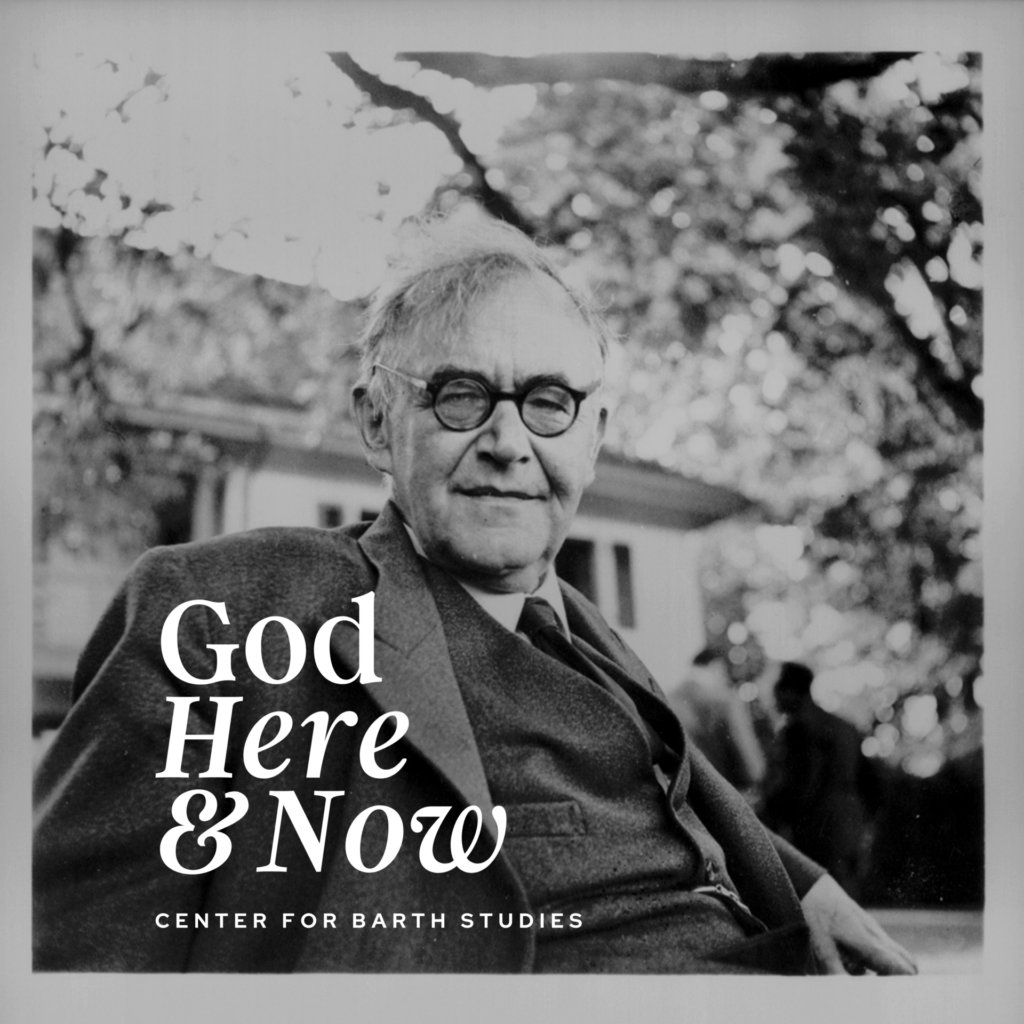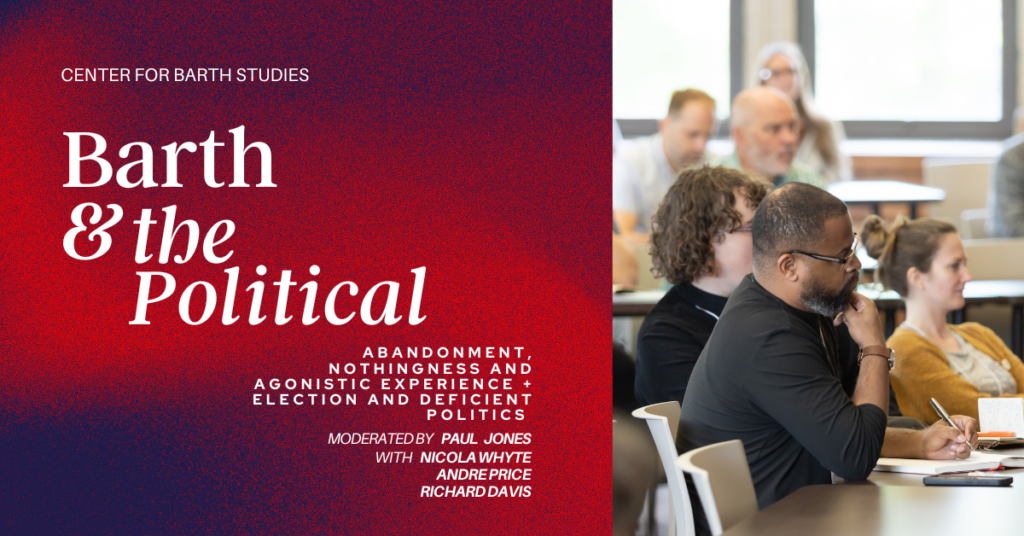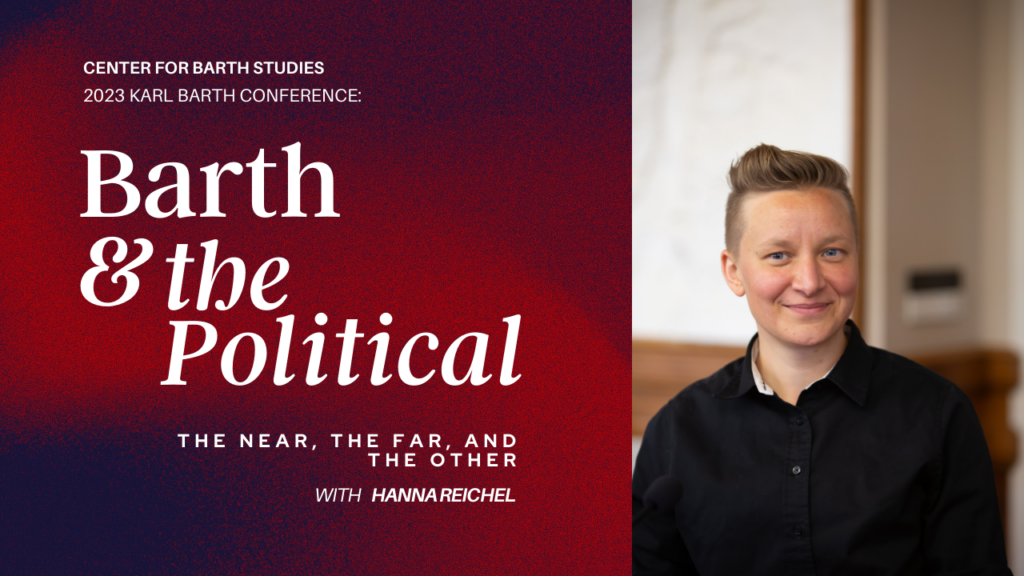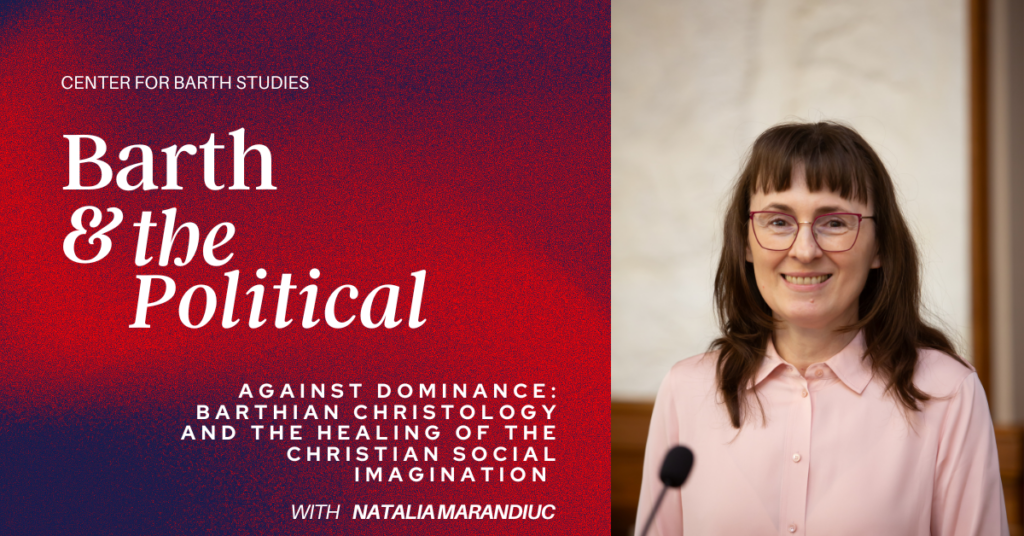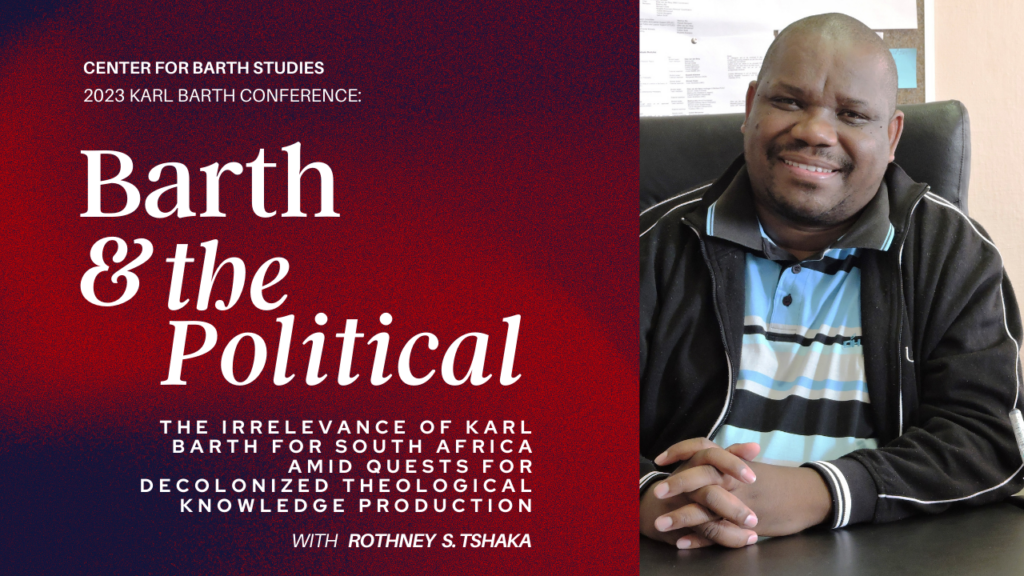About the author: Dr. Kait Dugan is the director of the Center for Barth Studies as well as curator of Princeton Theological Seminary’s Barth Special Research Collection. Kait is co-editor of The Finality of the Gospel: Karl Barth and the Tasks of Eschatology (Brill, 2022) and Karl Barth and Liberation Theology (T&T Clark, 2023). She is also the English language editor for Zeitschrift für Dialektische Theologie and the Theology Editor & Operations Manager for The Other Journal.
I am excited to announce the Center for Barth Studies at Princeton Theological Seminary is launching a blog this fall called “God Here and Now.” Our new blog will be in coordination with our forthcoming podcast by the same name. The name of the blog and podcast is inspired by Karl Barth’s short but rich book God Here and Now.1 In this text, Barth writes that the Christian proclamation—the good news of God’s “humanism” in Jesus Christ and the reality of the God who chooses to not be God without us—concerns the here and now. Paul M. van Buren notes that for Barth, this phrase God Here and Now, means “really God and really here and now: that is what Barth has to say; that is the trumpet call.”2 The gospel proclaims God enters into the here and now—into time and space—through the person of Jesus Christ. And this same God revealed in Jesus Christ encounters human beings in the here and now through the continual in-breaking of the Spirit of God in our midst. For Barth, the reality of God’s here and now in Jesus Christ should condition and shape the here and now of every person and community as the Spirit of God encounters them.
But the question I am constantly asking myself is this: how can we discern the Spirit of God’s activity in our midst? Everything around us in this world—from the horrifying and unspeakable atrocities in Israel and Gaza (and then in Ukraine and Yemen), the existential threat of climate change, the brutality of gun violence, the poverty that crushes billions around the world—seems to witness to the absence of God in the here and now. What makes this question of discernment even more difficult, at least for me, is the experience of stepping into certain Christian churches today where God’s activity can be easily identified and/or confidently named with ease. For some Christians, God is directly acting in finding me a parking space or God’s presence can be discerned confidently in our own emotional responses to a worship song. Or for other Christians, God is clearly on their side of the political struggle in history. As I have moved back and forth between feeling the lack of God’s presence in our death-dealing world and the perplexing confidence of some Christians in declaring God’s activity in the present, Barth does not seem to offer me any easy answers to this ever-present question.
·····
I am always a bit surprised when a scholar or student claims that Barth does not have a meaningful or developed doctrine of the Holy Spirit. In a technical sense, yes, Barth focuses so heavily on God’s revelation in Jesus Christ that some have leveled the incorrect charge against him that he is not trinitarian. Yet to me, this misses the forest for the trees. If one steps back from the page, the reader will quickly discern that Barth’s entire corpus is entirely dependent on the reality and activity of the Holy Spirit. And here’s an important point to highlight: Barth does not understand the whole of Christian life including God’s activity, theological speech, the church, and even one’s identity as a Christian as static and autonomous realities in themselves. Rather, human speech about the living God, the church’s witness to the living God, and the human being’s relation to the living God all exist as an event and in a dependent relation to the Spirit. Here the key is that God’s active Spirit is sovereign, because theology only becomes true speech about God, the church only becomes a true witness to the gospel, and the Christian only becomes thus in and through the Spirit of Christ. Barth’s insistence on and preference for the language of “becoming” rather than the language of “being” shows the utter dependency of creaturely life on the Spirit of God for us to know, proclaim, and live in witness to the gospel of Jesus Christ.
Admittedly, this dynamic view of God’s activity in the world through the power and work of the Holy Spirit opens a plethora of concrete theological questions for the present in terms of what it means to discern such divine activity. Barth was reluctant to make any definitive statements about how and where we can locate the presence of God in the world today. For Barth, the ability to make such declarative statements risks the kind of dangerous, violent, and death-dealing ideological manipulation that unfolded with the Nazi regime. Perhaps even worse, such declarations risk compromising Barth’s famous insights in his 1922 commentary on Paul’s epistle to the Romans3—that the God to whom the Bible witnesses is a free, living, and transcendent God who can be known and discerned only through God’s own self-revelation. Unless we want to be in danger of turning the living God into another object within the world that humans can control—and thus turn God into an idol—the theologian must insist that God is always and continually sovereign over the knowing event of God’s self-revelation. God must reveal Godself to humans for us to have true knowledge of who God is. And this in turn means that we can never make absolute and declarative statements about locating divine activity in the world in advance of that free and gracious event.
Yet there seems to be some tension even in Barth’s own thoughts about the possibility of such concrete human discernment regarding God’s activity in the world. The God who is revealed in the person and work of Jesus Christ takes on particular flesh in a particular time period and in a particular place. In the event of the Incarnation, this God revealed in Jesus Christ—whom Barth named “The Lord as Servant”—humbled himself by becoming human. Yet Barth insists that this humiliation occurs “not with any loss, not with any diminution or alteration of His Godhead,”4 because this identity “is not accidental” to him.5 Jesus Christ as servant is the revelation of God’s being from all eternity. The radicality of this claim in terms of the identity of God revealed in Jesus Christ cannot be overstated. This identity is what reveals Jesus Christ to be Lord over all other false gods that humans create:
…God shows Himself to be the great and true God in the fact that He can and will let His grace bear this cost, that He is capable and willing and ready for this condescension, this act of extravagance, this far journey. What makes our God above all false gods is that they are not capable and ready for this. In this otherworldliness and supernaturalness and otherness, etc. the gods are a reflection of the human pride which will not unbend, which will not stoop to that which is beneath it. God is not proud. In His high majesty He is humble. It is in this high humility that He speaks and acts as the God who reconciles the world to Himself.6
So what does Jesus’ identity as a servant have to do with naming where God might be acting in the present? According to Barth’s declarations here, it seems we can risk making statements about where God is moving in the world today, because of who God reveals Godself to be in Jesus Christ as we seek to follow after him in discipleship. We can risk naming God’s activity in the world because of the particularity and identity of the One we follow who will always be found amongst the least of these and with those whom the world despises.
·····
In short, Barth gives me no easy answers to my question. Either option—to reject or accept making positive statements about where God is or is not moving and active in the world today—seems to involve risk. There is the ever-present risk of opening up the gospel to ideological manipulation that has historically led to violence and death by naming definitively where God is acting in the present. Or there is the risk of staying silent and not taking clear stances in the midst of the world’s death-dealing powers by refusing to make such concrete judgments. Both options entail risk and vulnerability, and both ways demand that we continue to struggle through these important theological questions.
To be sure, these kinds of questions are complicated. And there is a lot at stake in how we might answer them. My hope is that this blog can be a space where we wrestle with these kinds of theological questions—without assuming the answers in advance. Together, I hope we can be bold enough to struggle through beginning to answer these questions as we seek to discern where God in Jesus Christ might be working and leading us in the here and now.

1. Karl Barth, God Here and Now, trans. Paul M. van Buren (New York: Routledge, 2003).
2. Barth, God Here and Now, xxi.
3. Karl Barth, The Epistle to the Romans, trans. Edwyn C. Hoskyns (Oxford: Oxford University Press, 1968). A helpful companion guide to this text is Kenneth Oakes, Reading Karl Barth: A Companion to Karl Barth’s Epistle to the Romans (Eugene, OR: Wipf & Stock, 2017).
4. Karl Barth, Church Dogmatics IV.1, 31 vols., ed. G.W. Bromiley and T.F. Torrance (New York: T&T Clark, 2009), 180.

